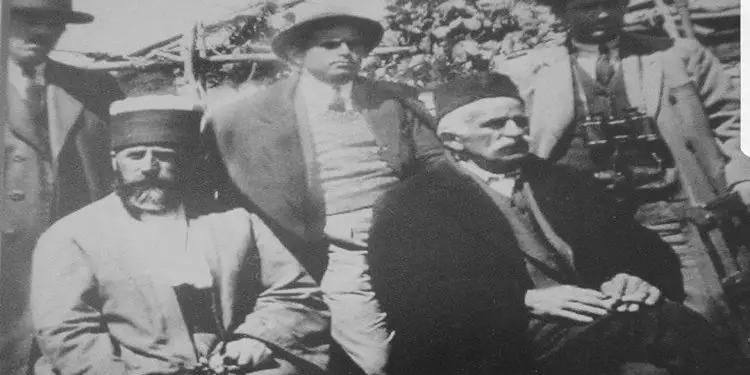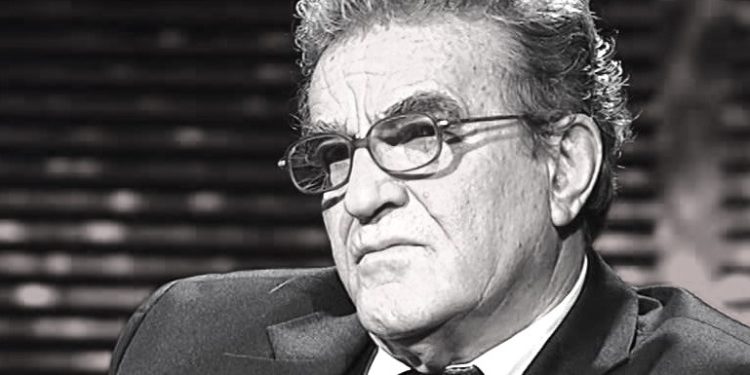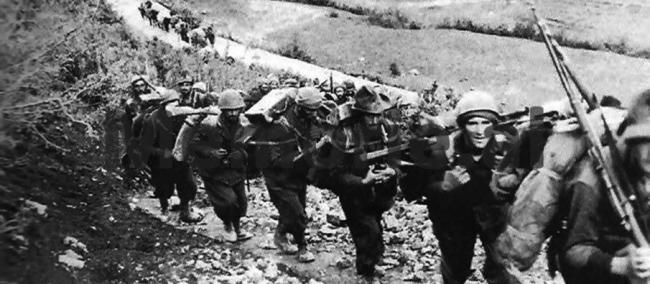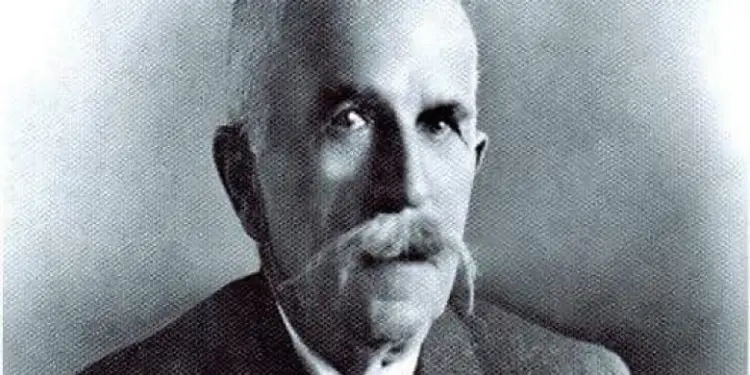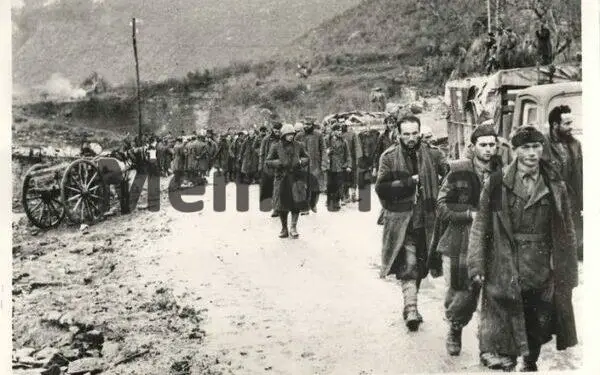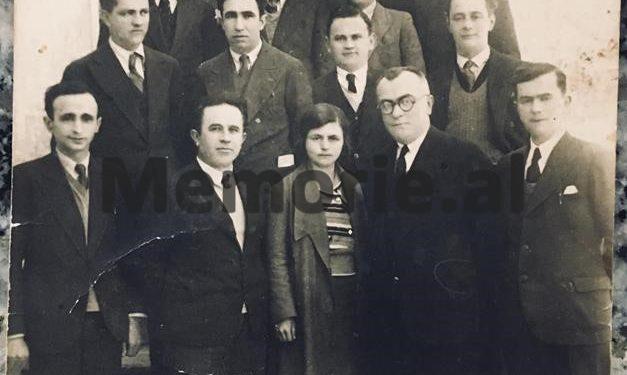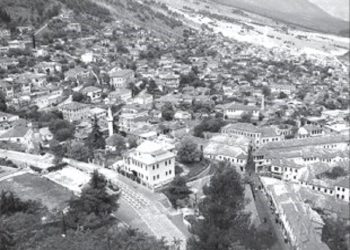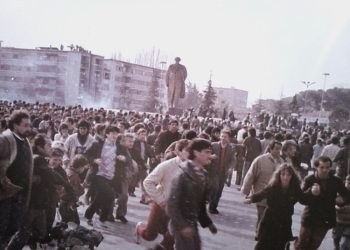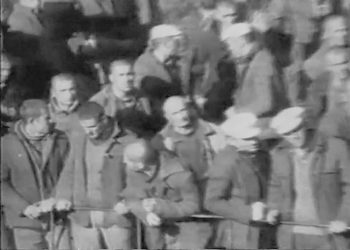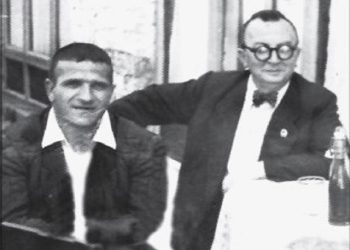By Dr. URAN BUTKA
Part Two
Memorie.al / The declaration of self-government of the Korça region on December 10, 1916, had historical causes, the risk of its annexation by Greece, before, during and after World War I. This thesis I want to argue in this article of mine. As is known, during the Balkan War of 1912 and afterwards, the regions of Korça and Gjirokastra were occupied by the Greek army, which established a military regime that, together with the Andartës and criminal gangs brought from Crete and the “holy battalions”, committed genocide against the Albanian population in 1913-14, such as the bloody massacres in the border villages of Kolonja and Leskovik, that of the villages of Kosinja in Përmet, where 75 Albanians were slaughtered, including 27 children, the Panarit massacre of July 10, 1914, where 374 innocent people were massacred, as well as the violent displacement of the population of the regions of Kolonja, Korça, Devolli, Përmet, Skrapar, and Gjirokastra towards the coast, especially in the Vlora region.
The balance of killed and massacred reached 7000 people, 192 villages burned, more than 100,000 people forcibly displaced from their homes, of whom 4000 died of hunger and typhus, in addition to the great material destruction, the burning of houses, the kidnapping of livestock and property. Some of these barbarities were presented by the Albanian Orthodox priest Papa Kosta Tomorri Leusa, in the book “Greek Barbarities in Albania”, published in 1917, precisely in the days of the Albanian Self-Government of Korça.
Continued from the previous issue
Military Commander Dekuan, responded positively to Sali Butka:
“Mr. Sali Butka
Commander of the Albanian Volunteer Fighters, Melçan.
According to the instructions received from the Commander-in-Chief of the Allied Armies of the East, General Sarrej, I have the honor to inform you that the Allied Command views with favor and appreciates your patriotic movement, for the rights of the Albanian people for freedom and independence. Also, I took into account the wishes expressed in your letter of the 3rd of this month, which I found reasonable, and I am authorized to communicate to you my consent and approval, as follows:
1 – Albanian autonomy of the Kaza of Korça, within the jurisdiction of the French occupation and within the boundaries determined by the Conference of Ambassadors in London.
2 – The official flag of the Kaza of Korça will be the flag of Skanderbeg, with the two-headed eagle proud.
3 – The official language will be Albanian, but correspondence with the French authorities will be in French.
4 – A government council with broad powers will be formed. All decisions will be approved by a delegate of the French Command, who will be called the advisory delegate.
5 – The closure of all foreign schools.
6 – An Albanian police force will be formed for the city services and a gendarmerie under the command of Albanian officers.
7 – A mobile gendarmerie will be formed under the command of a major French officer, which will cooperate with the French military units in eventual battles against the enemies.
8 – All branches of the administration will be composed of the autochthonous Albanian element, appointed by the government council with the approval of the delegate advisor.
9 – The Allied military command assumes the obligation to protect the autonomy of the kaza of Korça, from any danger that may threaten it.
10 – Your wish regarding the protection of Albania’s rights in the upcoming Peace Conference was also taken into account, which the commander referred to the government, since it does not depend on his powers.
Accept, Mr. Commander, the expressions of my most distinguished consideration.
By order of the Supreme Commander of the Allied Armies of the East”,
Colonel Dekuan
Commander of the Korça District
Sali Butka was delighted by the fulfillment of the proposed conditions: “Major,” he wrote to Major Masjet, “I am very pleased with the response of the General and please write to him to express my deep gratitude, along with my congratulations on the victory of the Allied powers. Also, please pay homage to the Colonel and assure him of my loyalty. Since today I am spiritually united with you and I await the opportunity to fully join your ranks”!
However, Sali Butka did not go to Korça, he still remained at the head of the fighters, to be present in Korça and Themistocle, in any circumstances, but also to make the same national representations to the Italian occupation authorities. It is known that Cologne was under Italian occupation.
Colonel Dekuan evaluates him as follows: “Sali Butka, informed of the events, informed me that he was taking our side. Through representatives of the Administration Council, new negotiations were held to determine the military measures that needed to be taken in order for him to be able to break away from the Austrians. In fact, this commander did not arrive. I would learn later that he would make representations to the Italian military authorities similar to those he had made in October 1916, to the French command. As for me, I have never seen him.
Did he deliberately break his promises, or was he unable to keep them? We remain convinced that the second alternative corresponds to the truth. Sali Butka became suspicious of the Austrians, who subjected him to strict surveillance and took his family hostage. In any case, he will always preoccupy me. On the contrary, his secretary Petraq Katro, in his delay in coming to us, I have good reason to believe that he made loyal efforts to assist the action of the local French command.
Colonel Dekuan, together with his staff and Themistoliu, worked all night and drafted the document declaring the self-government of the Kaza of Korça, which, according to Dekuan, would constitute in a way the “Fundamental Status of the Autonomous State of Korça”.
In the Protocol dated December 10, 1916, it is sanctioned: “According to the wish of the Albanian people, which was expressed through its representatives, the Kaza of Korça, together with the districts of Bilisht, Opar and Gora, form the self-governing province of Korça, to be governed by Albanian governors, under the protection of the command of the French army”.
Kazan would be governed by a commission of 14 Albanians, 7 Christians and 7 Muslims, the official language would be Albanian, the Albanian flag of Skanderbeg, with a tricolor ribbon of France. Themistokli Germenji was appointed Chief of Police, while Petro Harizi was elected Secretary General of the Government Council.
Dekuani describes the moment when the Protocol was publicly announced: “Themistokli went out on the balcony, addressed the people with a speech and, amidst cheers, unfurled the flag of Skanderbeg, tied with the French colors, in the place where the Greek flag had flown days before.”
This was a very important historical act in the history of Korça and Albania, because it affirmed the ethnic Albanian character of the Korça province and its administration by Albanians, it was an agreement with political and military content reached on the basis of parity and mutual interest, but with national values for us, not only at that moment, but also later during the confrontations at the Peace Conference, so that Korça would finally remain with Albania.
The French themselves were also interested in such an agreement. “To escape the risk of compromising our situation in Korça, we had to do something so that the Albanian population would be linked to us in an irrefutable and final way” – wrote Dequan. Likewise, General Sarrej, telegraphed to the Ministry of Foreign Affairs of France, in March 1917: “Korça wanted to be independent and it became so. Since then, peace reigns in this province”. In this historic achievement, prominent patriots from Korça and Kolonja, such as Petro Harizi, Petraq Katro, Dr. Mborja, Qamil Panariti, Emrullah Boshanji, etc., also helped.
However, in mid-1917, the international balance changed somewhat, as did the developments of the First World War. France was increasingly leaning towards Serbia and Greece, which was also shown by the treaties that were signed by it to the detriment of Albania, such as the Secret Treaty of London of 1915 and others later. France opposed the political content of the Protocol, since it contradicted Greek interests and the pro-Greek political orientations of the Paris government. This also affected the military positions and developments in Korça. The return to power of Venizelos, who brought Greece to the side of the Entente, in June 1917, for which political circles in France and beyond had been striving for a long time, changed the course of events in Korça.
Colonel Dequan was removed from Korça, as responsible for the signing of the protocol of December 10. The founder and leader of the Albanian Autonomous Province of Korça, Themistokli Germenji, was arrested by the French secret service and sent to Thessaloniki, where he was brought before a military court and sentenced to death, on fabricated and unproven charges of being an “agent” of the Central Powers, on November 9, 1917. Even Dekuani himself questions this decision: “The review of the Themistokli process in Albania is hotly desired in Albania. I am one of them too.”
And so it happened, then that decision was abrogated. After the shooting of Themistokli Germenji, the protocol of December 10 was also abrogated on February 16, 1918, which was a blow to the Albanian patriotic forces and our national cause, although Korça remained Albanian, where the Albanian flag once again flew. But the danger of its annexation by Greece not only remained, but also increased at the end of the war. The Greek government demanded at the Paris Peace Conference the annexation of Korça and Gjirokastra, with the outdated thesis that the Orthodox Albanians of these areas felt themselves to be Greek, that Greek schools existed there and that the Greek army had “liberated” these regions during the Balkan War from Ottoman rule. In fact, it had occupied them.
Equally threatening were Italy’s claims for an Italian protectorate over Albania and sovereignty over Vlora. The culmination of these chauvinistic demands was reached with the signing of the Tittoni-Venizelos Treaty on July 29, 1919, for the division of Albania between Italy and Greece, as well as to support each other’s claims at the Peace Conference. These agreements also found support from France.
The Greek government was preparing to militarily occupy Korça, as soon as the French left it. The Prime Minister of France, Clemenceau, was ready to make this offer and the Commander-in-Chief of the Allied Powers, General François d’Esperay, was ready to surrender Korça to the Greek forces. The population of Korça and its surroundings was shocked by this danger. Justin Godart stated: “August 25, 1919. News is circulating that the Greeks will occupy Korça. August 30, 1919. Terror reigns throughout the country. Approximately 180-200 families have abandoned Korça, so as not to find themselves under the hooves of the Greeks. Poor people who only want to live freely and in peace, in their homes”!
However, the patriotic forces of Korça were mobilized for defense. In Korça, a patriotic commission of 14 citizens was formed, which addressed Sali Butka with an appeal, through Baba Ramadan, chairman of the Commission for the Salvation of Korça, appointing him as commander-in-chief of the combat operations. The old man of Butka, set off towards Korça from Skrapar to Korça, with 800 fighters from Skrapar, Kolonja, Dangëlli, Opar, forces which were increased with fighters from Korça, reaching 1500 people in Gjergjevica, where the fighters’ headquarters was established. The French commander of the Korça gendarmerie, Captain Langre, reported to the commander-in-chief in Thessaloniki on September 7, 1919, on the preparations to hand over Korça to the Greek army, and informed him:
“Sali Butka has decided to intervene as soon as the Greeks enter the neutral zone…! The influence of Sali Butka, who is the undisputed master of the entire province up to Shkumbin, extends even further and is able to gather about 30,000 people, addressing the population of the south up to Vlora…! They will be joined by volunteers recently arrived from America. Finally, the union between the two large Tosk and Gheg groups would be achieved. All the people of Elbasan will intervene in favor of Korça”.
From Gjergjevica Sali Butka sent the ultimatum on September 12, 1919 to the commander of the French forces:
ULTIMATUM
In the name of the Albanian people,
Sali Butka, commander of the volunteer troops of the League of Eastern Albania.
To the Lord Commander-in-Chief of the French forces on the Albanian borders.
In Korça.
Commander,
Unbeknownst to the French people, to the high commission of the Peace Conference and against our will, your diplomacy, deceived by the flattering words of some Greek diplomats, pronounced the death sentence on the Albanian people, handing over the city of Korça and its districts to Greece, and this arbitrary and criminal act was coldly accepted by France, the protector of oppressed nations, the protector of the weak! This France, for which the Albanians of Korça and its districts have fought, shed their blood and won, says today to the Albanians: we will help the Greeks to come peacefully to you, to your homes in Korça, you do not object, let them kill you, we will do you a favor!
Upon the announcement of this sad news, a large number of Albanian nationalists have come and entered our ranks, under our flag. The greatest displacement of our unfortunate population has begun. Entire Albanian families, without means and hungry, were forced to quickly flee through the mountains, to escape the barbarities of the Greek hordes, which you are waiting for. Pushed to the extreme and unable to endure such humiliations any longer, we find ourselves obliged to warn you to surrender the city of Korça and its districts to us within 48 hours, following the delivery of this ultimatum.
Seeing that up to now, the French leaders of Korça have behaved paternally towards us, we owe them gratitude, for which reason we will not fire a single rifle against them.
We also do not desire any bloodshed. However, if the city of Korça and its region are not surrendered to us in a friendly manner and if the French General Staff orders you to attack us, we will not only defend ourselves, but we will also sacrifice ourselves to the last drop of Albanian blood, for the liberation of the sacred land of our beloved homeland, shamelessly sold by French diplomacy to our Greek enemies.”
Gjergjevica, September 12, 1919
Commander-in-Chief of the Volunteer Corps of the Eastern Albanian League
Sali Butka
The French commander of Korça informed the commander-in-chief in Thessaloniki, the commander-in-chief informed Paris, Paris again informed Thessaloniki, and Thessaloniki informed the French command in Korça, which informed Sali Butka in Gjergjevica, that the French command in Korça had received orders not to surrender Korça to the Greek armies. Korça would be surrendered to the Albanian forces.
This was a great achievement of the Albanian national forces, especially of the Korça region. Memorie.al




